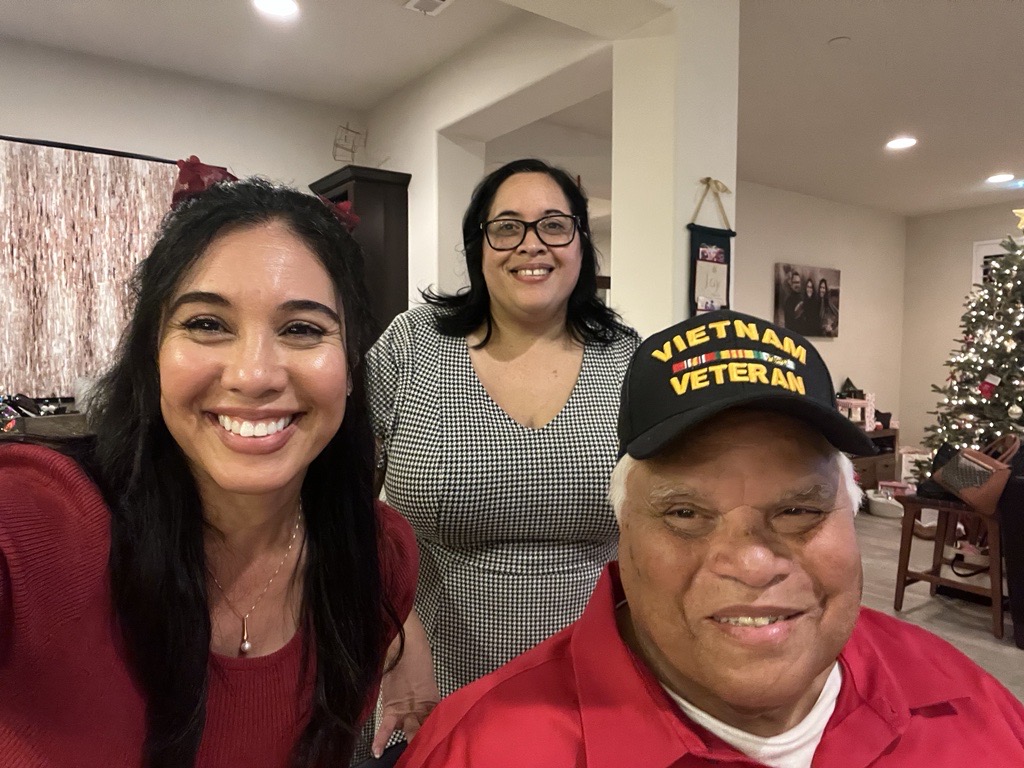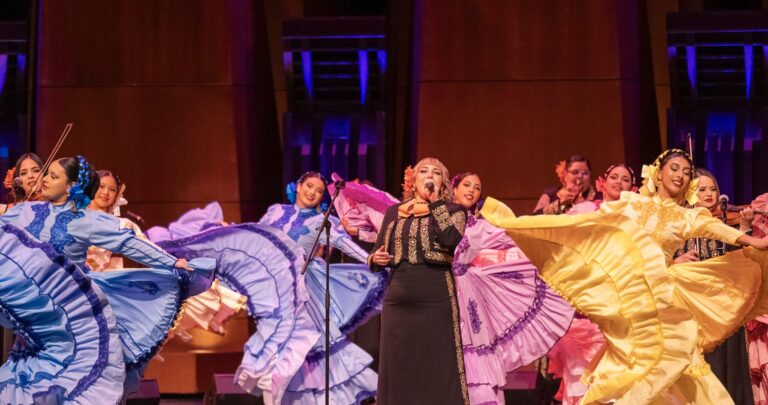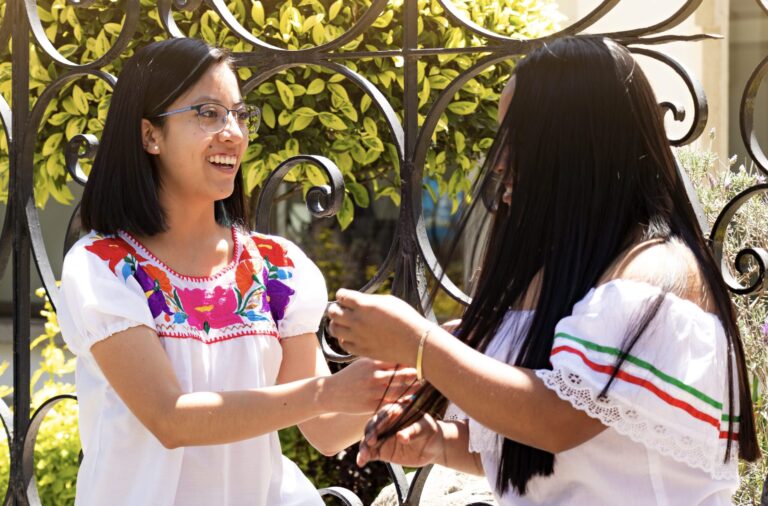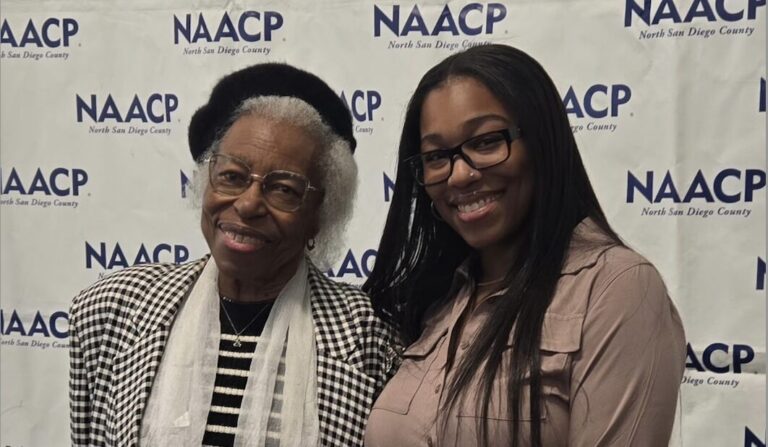By Melanie Slone
As we celebrate Black History Month, North County Informador has talked with four community members who identify as Afro Latina or Afro Latina about their experiences.
The search for identity is powerful in all of us, and it can be even more so in people of mixed heritage, as are many Afro Latinos in North County San Diego. “It is important to understand your whole self,” says Roberta Camarena, Director of Chancellor–Community Relations, UC San Diego, alumna of UC San Diego, and parent of an alumna of UC San Diego. Her mother is Mexican, and her biological father is Black.
“For all the Latinos and Latinas…not everybody looks the same in every country, every Latin American country,” says Roberta.
The need to fit into a box can be overwhelming. When Will Roy Tate II, an Oceanside community member whose father is half Black and half Filipino and mother is Mexican, started his college days at University of San Diego, he began “really trying to understand my identity and feeling like an outlier, of not being Black enough, not being Latino enough, not being Filipino enough.”
As he began to understand his Black identity and his Latino identity, he asked “how do I combine the two. Do I pick one?”
Roberta has seen similar struggles. When she went to UC San Diego, she had to choose whether she was Afro Latina or Mexican American. “I didn’t have an option to choose both.”
Sonia Gonzales, Director of Community Engagement, TrueCare, whose father is Black Puerto Rican and mother is Mexican, says she didn’t fit in one specific community. “I think it was very hard for me in a lot of spaces where I didn’t see anyone that looked like me…There wasn’t a lot of relatability … I was never ashamed of who I am. I just didn’t know where I fit.”
Diversity
Carlos A. Martinez explains why diversity is important.
- Diverse communities are drivers of innovation and economic progress, bringing together varied skills, perspectives, and ideas that spur creativity and problem solving.
- Promoting diversity reduces discrimination, encourages equity, and builds cohesive, inclusive societies where everyone feels valued and respected.
- Exposure to diverse cultures and perspectives fosters open-mindedness and empathy and prepares individuals to thrive in an interconnected, globalized world.
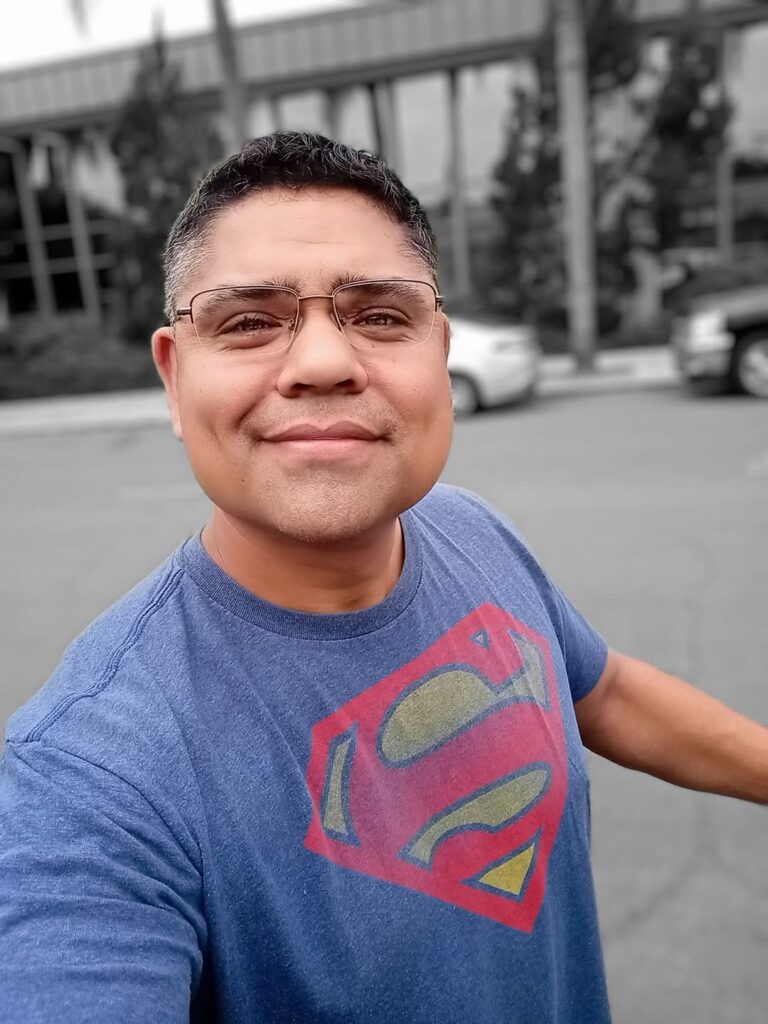
At the same time, “it’s been a blessing and a curse to be honest, says Sonia. “It allowed me that lens to appreciate every culture.”
Carlos A. Martinez, Business Technology Support Supervisor, School of Social Sciences, UCSD, has an even more mixed heritage, with ancestors from Guyana. He has Black, Spanish, Portuguese, British, Chinese, and Indian heritage on his mother’s side; and his father, whom he never met, is Mexican.
“One of the reasons I went to school was to educate myself about my family,” says Carlos. “During the slave trade days, when tobacco and sugar were the big crop, the Portuguese and the Spanish would go and get slaves… they would take them to places like the Caribbean or Guyana and Trinidad and Tobago. …My great-great grandmother was raped on her journey over from Africa, which produced offspring… and here I am.”
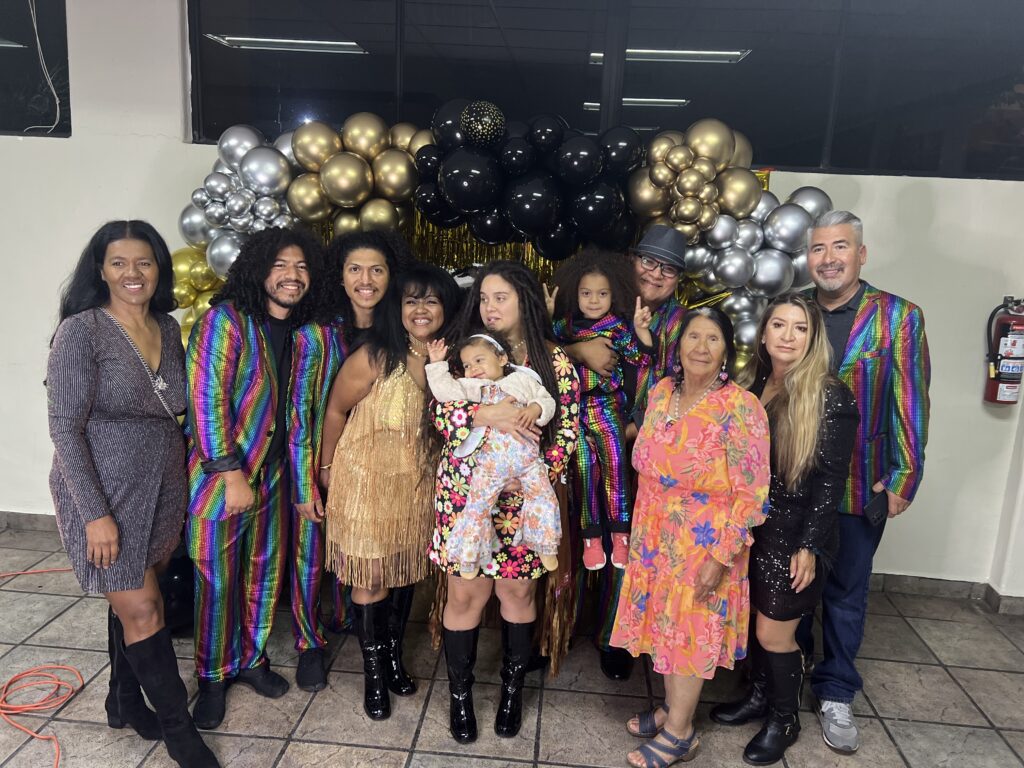
Stereotypes
Growing up, all four faced challenges.
As a child, Sonia’s sister told a teacher her father was Black, but the teacher told her he was Puerto Rican. In fact, Sonia’s father is Black Puerto Rican.
Although Will says Oceanside is a diverse city, “I was Black at school, and I was Mexican and Black at home. I really didn’t get to understand my Filipino side.”
Roberta says the went to Mar Vista High School. “Apart from kids saying little words about my color, I really saw myself just as a Mexican. And when I came to UC San Diego, it was very eye opening for me. It made connections. Oh, that’s why that person looked at me that way when I spoke Spanish. Because they thought they were looking at and African American young lady.”
Sonia says she wanted to be an opera singer. “I could never see anybody that looked like me singing opera.” When she auditioned at local theaters, girls would laugh at her and ask, “what is she going to do for her audition piece, The Mexican Hat Dance?”
Carlos felt different in a community that was not like he was. “I learned really well to become a mimic and just kind of fit into different groups. When I hung out with the Puerto Ricans, I was Puerto Rican. When I hung out with the Mexicans, I was Mexican. When I hung out with the Asians, I was Asian. When I hung out with the Black people, I was Black. I learned how to identify with those things and encompass them,” he says.
“I hold all of them close to my heart because I really feel like I identify with all of them in some way,” Carlos tells us. “Even at home I was an immigrant because I was an American and my mother wasn’t.”
Roberta notes that some things have changed. “Now, they have race versus the type of culture identity. So, I can now choose Mexican American and then choose Black as my race, which is a benefit. And that’s what my son got to do. That’s why I say the world is changing.”
She says, “It’s in transition right now, where Latinos and Latinas, Latinx, Latine are being looked at holistically, looking at every aspect.”
“Being in education I think is really empowering because it helps me have a window and a door to see more of who I am… being able to say, you know what? I don’t have to choose. I don’t have to pick one or the other. I am my identity, and I’m both,” says Roberta.
Still, Will adds that sometimes it can be challenging to talk about identity. “If I want to understand my Blackness, people are offended at that now.” He says he has been told, “There’s more to you than just being Black. That’s what I’ve heard. There’s more to you than just being Mexican.” But he feels, “I’m just getting started in learning who I am.”
Carlos faces similar challenges. “Even now, I go to African American or Latino gatherings and there like you’re not Black, or you’re not Latino, or whatever. And I’m like, well, what does that look like to you? What does that sound like to you? …I am a Latino, and this is what Latinos sound like. I am Black, and this is what Black people sound like,” he says.
Nurture vs. Nature
Roberta studied biochemistry at UCSD, where she learned about nature versus nurture. “I delved into that,” she says.
“For me it was important to understand not only my cultural role, being culturally aware, but also genetically aware.” Roberta credits her genes with giving her the ability to play soccer well and become the team captain at her predominantly White high school.
“There are some things that are genetic, they’re just predestined, like the gap in my teeth,” she adds…as I started meeting more African Americans, I realized that that’s a genetic trait for Black people.” Although Roberta decided not remove her gap, her daughter did choose to get braces. “Removing that gap for her was important. I said, go, you do whatever’s good for you.”
Roberta prefers to turn challenges into strengths. “Unless someone really dives into everything of themselves—not only is it how they’re raised, the nurture, but also how they’re made up, the nature. Combining those makes you the best you that you can be.”

Tips for Others
One of the most significant tips for others is the importance of mentorship. “I absolutely believe that I am beyond blessed for the folks that have invested in my life,” says Will.
He is still in contact with his elementary school teachers who he says called out the greatness in him. “They were able to see something in me before I saw it in myself.”
Other community mentors include Jimmy Figueroa, Pastor Chris Martinez, and Beatriz (Bea) Palmer, among many more. “All of them come from a diverse background as well,” says Will. “Those are the folks who invested in me at the time.”
Thanks to mentorship, Will says, “I was fortunate enough to receive the Bill & Melinda Gates Scholarship, which is a full ride up to my PhD and a couple of other scholarships.”
Sonia also says she has found several mentors in the community, like Beatriz (Bea) Palmer. “Seeing her journey and being so vocal about her identities, just embracing everything about who she is,” says Sonia.
Carlos agrees that mentors are important. “They helped guide me, especially coming from a place where you don’t have a lot of access to things…people taking an interest in you and giving you information.”
Will emphasizes the importance of community. “You can’t do it alone, but nobody can do it for you,” he says. “A lot of people talk about self-made millionaires. But they had help. They happened to have family members, the happen to have met somebody along the way who believed in them. And now they are where they are.”
Carlos feels the same way. “It’s not what you hear; it’s what you do with that information. People are helping you all around, but you have to be willing to see and act on it…It’s not going to be handed to you. …You have to take ownership of your own life,” he says. He joined the Marine Corps, which helped give him direction.
Will adds, “I would really relay the message of as a community, we’re all looking out for each other…Identify those mentors who will invest in you. No matter who the community member is, it’s important to really invest in them because they’re going to be the future leaders in the community.”
Roberta also talks about community. When she studied at UCSD in the 1908s, there were very few Black students. “I could see a Black student from a distance. And we would have this nod. We would nod at each other, like, I see you. And that was so important because there were so few of us.”
To overcome self-doubt and imposter syndrome, Roberta says, “You have to have allies. No matter what arena I’ve ever been in, I either have a mentor or a champion or an ally…There’s always going to be someone that has that warm smile. Head in that direction, and that connection will give them strength. And then that person will possibly become their champion or their mentor.”
Sonia pushes everyone to take part in their community. “Be a part of the system. Don’t let other people decide for you. A lot of times we don’t vote, aren’t part of civic engagement.” She urges everyone not to be a recipient of what other people decide. “Don’t let that happen. Be a part of the process.”
Roberta says it’s important to face our fears head on. “Sometimes it’s easier to fake it than to just confront the elephant in the room…I have to see that elephant. I have to confront it every time I walk into a new space. Sometimes it’s external, and sometimes it’s just internal.”
In her upper division math classes, Roberta was the only African American, the only Latina, and often the only woman. “There’s no faking it there. I have to say, yes, I’m the only one, and I’m okay with that because I’m strong…Once they taste and they see and they hear, they’re like, ok, we want a piece of her, too.”
Will says he wants to understand his own identity more so he can help others. “Then, I’m able to assist and be a mentor and make sure than I’m able to connect with those who I really want to, the idea of lifting as we climb.”
“If I want to learn more about my identity as a Black male or as a Latino, that’s important for me, and it’s also important for me to acknowledge somebody else and their endeavors,” he says.
Sonia is also part of the fight. “I think we’re doing a lot of work now to elevate the different cultures that are out there and the diversity that’s out there,” she says. “I think there are barriers for people when they don’t see representation.”
She urges others to go through doors no matter how intimidating it may seem. “It’s just a natural response to being the first one through a certain door. Just do it because you have to leave it open for the next person…You may be the first one, but you could be the first of many.”
Sonia feels not enough stories are being shared about mixed ethnic groups. “When I started doing a little bit of research, Mexican Puerto Ricans and Mexican Cubans, all these different…Dominican and Puerto Rican, all these different Afro Latinos…There’s not enough storytelling going out about the diversity that’s out there and the contributions that are made.”
She reminds everyone to speak up. “The world needs who you are, needs your voice, needs your gifts. That’s how change comes about, not being afraid to share who you are.”
Carlos urges others to give back to their communities and build bridges. “Even a simple gesture or smile can change someone’s world, what might not be a big deal to you—a letter of recommendation, donation of your time, sending messages of hope and support, providing care and support to your neighbor,” he says.
Finally, Roberta asks everyone to “Serve as that person” who can open the door. “Extend a hand, communicate,” she says. We’re all humans, right? We’re all human.”
Food, Music, and Language
Cultural aspects play an important role in a person’s identity, say Roberta, Sonia, Will, and Carlos.
In fact, when Roberta visited New Orleans, the food made her realize a part of her was missing. “It felt like it was a piece of me that I had been missing because I don’t know the actual cultural identity of my biological father. …I don’t know if he’s from Panama. I don’t know if he’s from Cuba.”
Sonia believes food serves as a uniting force. Decades ago, when her father was stationed in Vietnam over Christmas, his mother mailed a lechon with rice and all the fixings. “He was able to have a Christmas dinner with all the troops there,” she says, emotionally.
Will takes pride in the fact that he can cook food from all three cultures. “I can definitely cook very, very well with all those different types of foods.”
Carlos says, “I grew up with a lot of different foods that even now I don’t see at restaurants.” The mixed cultures in Guyana are the basis for unique dishes like Pepperpot at the same time that they boast Chinese, Indian, and even Irish staples.
As a hallmark of Latino culture, Spanish can also forge identity.
“I think it is important for every person to know and to strengthen themselves based on what they’re made out of” says Roberta. “The fact that I speak Spanish and the fact that that was my first language is a huge strength…And then I went ahead and studied it at UC San Diego so that I could speak Spanish not only the colloquial dialect but also the academic one, which strengthened that aspect of me.”
Language can also remind us of our differences.
Sonia says mother suffered abuse in school for not speaking English. “She was put into a class at the age of 12 with students with learning disabilities and different things that caused them to act out. Here’s kids pulling her hair and spitting on her.”
She made sure her daughters would not go through the same thing, says Sonia. “Thankfully, I retained enough to still be able to communicate on some level, but…I feel very insecure because when I would speak Spanish in Puerto Rico, I was getting made fun of…And here it wasn’t proper enough. And I was doing my Spanglish and trying to fill in things.”
Will adds that he understands Spanish but tends to respond in English. “My mom and my grandma hated that,” he says.
Carlos did not grow up a Spanish speaker. His mother speaks Patois, a Jamaican dialect of English. This trait of the Caribbean is another facet of the Latino culture.
Music holds a special place in the soul and reflects cultural belonging.
Roberta remembers, “We had the UC -wide Latinx leadership conference, and the music was Latin from another country outside of Mexico. That was really refreshing to have music that I could relate to, not only myself as an Afro Latina, but also looking at different Latin American countries that aren’t just right across the border.”
Still, says Sonia, it goes way beyond the food and the dancing and the music…It’s a culture full of connection, and everything is very community-based, where you kind of know what’s going on with every family.”

